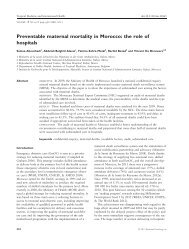Preventing Childhood Obesity - Evidence Policy and Practice.pdf
Preventing Childhood Obesity - Evidence Policy and Practice.pdf
Preventing Childhood Obesity - Evidence Policy and Practice.pdf
You also want an ePaper? Increase the reach of your titles
YUMPU automatically turns print PDFs into web optimized ePapers that Google loves.
CHAPTER 32<br />
Working with m inority g roups in<br />
d eveloped c ountries<br />
Lisa Gibbs, 1 Mulugeta Abebe 2 <strong>and</strong> Elisha Riggs 1<br />
1 Jack Brockhoff Child Health <strong>and</strong> Wellbeing Program, McCaughey Centre, Melbourne<br />
School of Population Health, University of Melbourne, Melbourne, Australia<br />
2 Merri Community Health Services, Melbourne, Australia<br />
Summary <strong>and</strong> recommendations<br />
for research <strong>and</strong> practice<br />
• Ethnic diversity adds to the complexity of developing<br />
<strong>and</strong> implementing effective community - based<br />
obesity prevention research <strong>and</strong> programs.<br />
• Models of cultural competence in public health<br />
research provide guidance in working with minority<br />
groups in developed countries.<br />
• Working with minority groups requires researchers<br />
<strong>and</strong> practitioners to be reflective about their own<br />
cultural framework.<br />
• Flexibility in communication styles, research processes,<br />
program strategies <strong>and</strong> methodologies<br />
increases the potential for meaningful involvement<br />
of minority groups.<br />
• Respectful, participatory approaches allow for<br />
mutual knowledge exchange <strong>and</strong> support relevant<br />
research <strong>and</strong> program outcomes.<br />
• Culturally competent community - based research<br />
<strong>and</strong> programs may help to address health inequities<br />
that operate in relation to ethnicity <strong>and</strong> overweight/<br />
obesity.<br />
Introduction<br />
Incorporating the e vidence<br />
The complexity of developing community - based<br />
obesity prevention interventions is well established. It<br />
<strong>Preventing</strong> <strong>Childhood</strong> <strong>Obesity</strong>. Edited by<br />
E. Waters, B.A. Swinburn, J.C. Seidell <strong>and</strong> R. Uauy.<br />
© 2010 Blackwell Publishing.<br />
arises from the range of socio - environmental influences<br />
on changes in weight status at a population<br />
level 1 <strong>and</strong> the subsequent need for multi - level, sustainable<br />
strategies in different settings <strong>and</strong> contexts. 2<br />
The lack of uniformity in “real-world ” settings is<br />
increasingly recognized as a challenge for study design,<br />
implementation <strong>and</strong> evaluation. 3 This is further complicated<br />
by the global increase in population diversity<br />
in developed countries. 4<br />
The evidence on health inequities for minority<br />
groups in developed countries is well established <strong>and</strong><br />
highlights the need for consideration of diversity<br />
in obesity prevention efforts. It requires a flexible,<br />
culturally competent approach to the design <strong>and</strong><br />
implementation of interventions (see Box 32.1 ).<br />
Culturally com petent strategies for public health<br />
research <strong>and</strong> interventions have recently been developed<br />
to guide this process <strong>and</strong> are used as the basis for<br />
this chapter. 5,6 These strategies are designed to assist<br />
researchers to shift from an expert - driven to a participatory<br />
approach with increasing underst<strong>and</strong>ing <strong>and</strong><br />
capa city for accommodating the added complexity<br />
inherent in cross - cultural exchanges. The intention is<br />
to encourage a culturally reflective process among<br />
researchers <strong>and</strong> health promotion practitioners who<br />
are working with minority groups in developed countries.<br />
This chapter is particularly relevant to those<br />
involved in public health <strong>and</strong> health promotion<br />
community - based research <strong>and</strong> interventions. The<br />
term “ interventions ” is a research term that potentially<br />
has negative connotations to lay readers. Therefore,<br />
for the remainder of the chapter the alternative terms,<br />
“ programs ” , “ initiatives ” <strong>and</strong> “ strategies ” are used.<br />
276

















